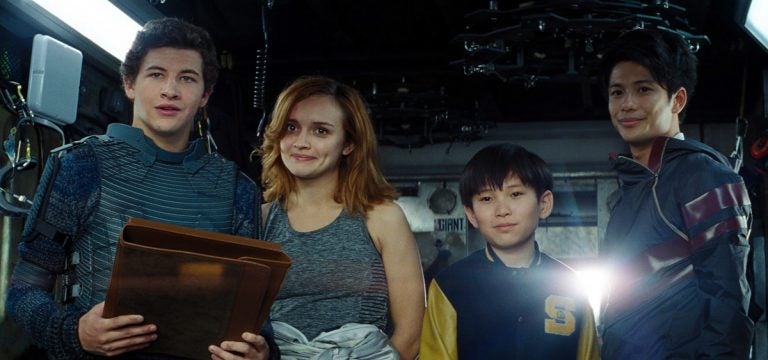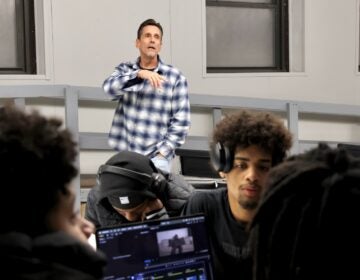Blockbuster ‘Ready Player One’ a natural next step for Spielberg’s relentless career
Spielberg’s success has made him such a quintessential figure that, if you asked 10 people on the street to a name a film director, all 10 might very well identify him.

This cover image released by Warner Bros. Pictures shows Tye Sheridan, from left, Olivia Cooke, Philip Zhao, and Win Morisaki in a scene from "Ready Player One." (Warner Bros. Pictures via AP)
Steven Spielberg had a message for the SXSW audience last month as it awaited the premiere of “Ready Player One,” his highly anticipated blockbuster based on the best-selling novel.
“This is not a film we made,” he declared. “This is, I promise you, a movie.”
That promise was kept. “Ready Player One” takes place in 2045, when most people spend their time in a virtual reality world known as the Oasis. The creator of the Oasis promises his fortune and ownership of the world to the first person to find a hidden feature, or “Easter egg,” in the game. The movie, released on March 29, is great visual entertainment and a skillful adaptation of source material that many criticized as derivative and misogynistic. It’s an enjoyable adventure, although far from a game-changing one.
Upon reflection, I was drawn to Spielberg’s previous picture, “The Post,” which he would definitely have identified as a film and not a movie. A well-acted and engrossing drama about Katharine Graham and the Washington Post’s publication of the Pentagon Papers, it was widely expected to rule award season, but it was lost in the shuffle.
That’s likely because it looked like the work of a master operating at less than full power. Imagine LeBron James just going through the motions in a regular-season Cavaliers game.
Much like his 2012 outing, “Lincoln,” “The Post” came off like an excellent episode in the middle of a mini-series. Turns out the story’s full scope wasn’t addressed because the filmmakers didn’t have time to do more. Spielberg made “The Post” in 10 months due to its timely nature but also because he had to fit it in among the post-production special effects work on “Ready Player One.”
Revelations like these make Spielberg sound more like a studio exec or the major producer he is than an auteur. He’s constantly juggling ideas, which sadly results in a list of unrealized projects a mile long.
Spielberg’s monumental success has made him such a quintessential figure that, if you asked 10 people on the street to a name a film director, all 10 might very well identify him. But he’s not immune to criticism.
Purists have always felt that he ranks a tier below his peers artistically. Many even believe his career has hurt the film industry. Critic Peter Biskind captured this point of view in his otherwise excellent history of 1970s cinema, “Easy Riders, Raging Bulls.” According to Biskind, Spielberg’s mammoth success snuffed out the creative rebellion of the era by making it all about the money again.
This attitude has understandably always irked Spielberg. While every other New Hollywood movie brat except Martin Scorsese eventually flamed out, he’s 71 years old and still moving at full speed. After all, this is the guy who Stanley Kubrick, a man whose cinematic genius was matched only by his singular reclusiveness, took in as a friend and peer. (Spielberg pays an enormous tribute to Kubrick in “Ready Player One.”)
Recently I rewatched “E.T. the Extra Terrestrial” for the first time in years, and the experience seemed to confirm what I already thought: This bifurcated Spielberg didn’t always exist. Ostensibly a kids’ movie, “E.T.” holds up as a phenomenal piece of filmmaking.
So do other other early efforts, including “Jaws,” “Close Encounters of the Third Kind,” and “Raiders of the Lost Ark.”
It was in the mid-1980s when Spielberg appears to have made a concerted attempt to be taken seriously with films such as “The Color Purple” and “Empire of the Sun.” Subsequently he developed the routine of shifting from commercial blockbuster to prestige film, a strategy that peaked in 1993 with the releases of “Jurassic Park” and “Schindler’s List.” The former ushered in the CGI revolution and smashed box office records, while the latter swept the Oscars and currently sits at eighth on AFI’s Top Movie list.
Unfortunately, in the 25 years since, he has not made a blockbuster as good as “Jurassic Park” or a drama as good as “Schindler’s List.”
I wish Spielberg would take a page out of Kubrick’s book and take more time with a project. A few years ago, he purchased the rights to a script about Napoleon Bonaparte that Kubrick spent decades on. Spielberg could use that trove of research to create a movie or mini-series that would stand the test of time like his old classics.
However, I remember the old rumor that Spielberg secretly directed “Poltergeist” while he was also making “E.T.” He has also revealed that he saw “Jaws” as a stepping stone to get his dream film about UFOs (“Close Encounters”) made. Not to mention the fact that he took any TV job he could to build his portfolio and prove his bona fides.
Just recently, fan and fellow director Edgar Wright interviewed him about “Duel,” a 1971 ABC movie of the week made in a hectic 11 days that just so happened to be his first masterpiece. So maybe the nonstop pace, the numerous production credits, the cascade of unfinished projects, and even the split film/movie philosophy all make sense, after all.
“The only thing that counts is how your intuition guides you,” Spielberg told Wright. “And it’s all about that. Every movie I’ve made, or most of the films I’ve made, have not been consciously based on some kind of a long-view game plan. So many of them have combusted spontaneously.
“That’s only because the second I think about what I should do next, I’ll probably not do that next. The more I think about something, the greater the chance I’ll never make it. It’s the things I just impulsively commit to that somehow feel right to me. I let that pretty much guide me for the last 49 years of making TV and film.”
WHYY is your source for fact-based, in-depth journalism and information. As a nonprofit organization, we rely on financial support from readers like you. Please give today.





